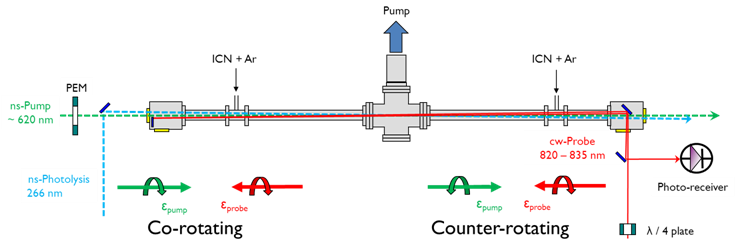
Polarization Transfer
The dynamics of inelastic collision of CN radicals with atomic and molecular colliders is studied.
|
|
|

|
Frequency-modulated spectroscopy is used as a high-sensitivity probe of the time evolution of rotational polarization. |
Transfer and loss of polarization in inelastic collisions
These experiments study rotational energy transfer in electronically excited CN(A2∏). A thermalised sample of CN(X2∑+) is prepared by laser photolysis of ICN in a bath (0.1-1.5 Torr) of the collider gas. A separate tuneable laser pulse is used to prepare a single rotational quantum state of the CN(A, v =4) level. Using a circularly polarized pump photon we prepare the CN radicals preferentially rotating in a particular plane in the laboratory, with either a clockwise or anti-clockwise sense, creating an orientation. The CN radicals collide with the surrounding gas and undergo energy transfer. We probe the products of transfer to other rotational and fine-structure levels of the CN(A, v = 4) level using a continuous probe laser via frequency modulated stimulated emission spectroscopy. With the probe laser circularly polarized, we can measure the sense of the rotation of the product levels, and thereby the degree of orientation transferred. This is a sensitive probe of the forces involved in the collision. We have observed dramatic oscillations in the transferred orientation for collisions with Ar, which depend on the parity of the final rotational state, and hence must be the result of a purely quantum interference effect. This unexpected behaviour is reproduced by Quantum Scattering calculations performed by our theoretical collaborators (Prof Millard Alexander and Prof Paul Dagdigian). This work has been published in the Journal of Chemical Physics. Our on-going work in this area focuses on collisions with small molecules and a more detailed description of the reasons behind this unexpected observation.
-
Parity-Dependent Oscillations in Collisional Polarization Transfer: CN(A2Π, v = 4) + Ar
Journal of Chemical Physics (2013), 139, 124304
doi: 10.1063/1.4821602
Depolarisation of Rotational Angular Momentum in CN(A2Π, v = 4) + Ar Collisions
Journal of Chemical Physics (2012), 136, 164306
doi: 10.1063/1.4705118
